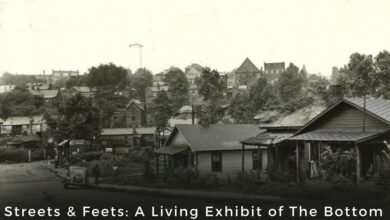At Virginia’s Black history museums, local figures become part of a national story

The impacts from the narratives and figures of Black history often have nationwide implications, but not always. While Martin Luther King Jr. may be nationally recognized, more obscure local figures are no less important.
This was the sentiment shared by Charles Price, the head of the board overseeing the Harrison Museum of African American Culture, one of around two dozen museums in the state dedicated to African American history.
Located in Roanoke, the Harrison Museum features exhibits that emphasize local history while putting on programs about Frederick Douglass and other larger-than-life national figures.
To Price and others, the distinction between local history and national history should not be mistaken for a hierarchy.
“I would venture to tell you that local history is impacted by,” Price said. “We don’t want to pigeonhole ourselves … with one kind of history. When you do that, then you are not aware of what’s changing around you.”
The national inspires the local, and local grassroots efforts provide a foundation for larger initiatives, according to Price, who said even King’s work as a community organizer and civil rights advocate began as a grassroots movement.
Visit the museums featured in this story
Fayette Area Historical Initiative
- 211 Fayette St., Martinsville
- Open Wednesdays 10 a.m.-6 p.m., Thursdays and Fridays 10 a.m.-4 p.m., first and third Saturdays 10 a.m.-3 p.m.
- FAHI features a gallery of artifacts depicting history in and around Fayette Street.
Harrison Museum of African American Culture
- 1 Market Square S.E. (Center in the Square), Roanoke
- Open Wednesday, Thursday, Friday, Saturday 10 a.m.-3 p.m.
- Current exhibit is themed around Dr. Martin Luther King Jr. ’s final hours.
Freedom House Museum
- 1315 Duke St., Alexandria
- Open Thursday and Friday 11 a.m.- 4 p.m., Saturday 11 a.m.-5 p.m., Sunday and Monday 1- 5 p.m.
- Current exhibit, “Searching for Truth in the Garden,” seeks to unearth little-known facts about Alexandria’s history with slavery.
African American Heritage Museum
- 410 E. Franklin St., Wytheville
- Open Monday to Friday 1-6 p.m., Saturday 11:30 a.m.-3:30 p.m.
- “The Art of Resistance” is a Black History Month exhibit that begins Feb. 17.
Many Black history museums start out hyper-focused on a particular piece of local Black history before eventually branching out.
Price believes that Black history museums tend to combine local, more obscure, histories with better-known national events out of an innate knowledge of the importance of both.
“We started out wanting to showcase the rich history of this area,” said Charisse Hairston of the Fayette Area Historical Initiative, or FAHI, a Martinsville-based Black history museum.
Hairston began as FAHI’s executive director in January. Founded in 2004 to preserve the memory of a once bustling Black business district along Martinsville Fayette Street, FAHI has seen its mission grow to encompass the entire city and beyond.
“This year we will celebrate our 20th anniversary,” Hairston said. “When FAHI was first founded … there was so much rich history. The purpose originally was to show the rich history in this particular area, then they extended out to Martinsville and the Henry County area.”
Like her Roanoke counterpart, Hairston said there is a free flow of impact between local, regional, statewide and national history. The museum’s content reflects this with exhibits meant to help visitors traverse historic events both local and national.
Hairston’s Alexandria counterpart agrees, saying that nationally meaningful history has to start somewhere, no matter how small.
“Alexandria’s history has an impact on our national story,” said Audrey Davis, the director of Alexiandria’s Division of African American History.
Davis’ position places her in leadership positions at a number of museums and cultural centers, including the Alexandria Black History Museum, the Watson Reading Room, the Alexandria African American Heritage Park and the Freedom House Museum.
Speaking specifically about the Freedom House Museum, Davis said its roots can be traced back to American slavery.
The Freedom House Museum is among the last remnants of a building that once served as a slave auction that facilitated transport from Northern Virginia to the Deep South.
The museum was founded in 2008, and its original mission was to preserve the history of the building that houses it. In the years since, that mission, much like that of other Black history museums, has broadened, with Davis saying the importance of capturing local and national Black history continues to be important.
“While African American history was often left out of our national narrative due to racism and white supremacy, Black history still survives,” Davis said. “It survives in the voice of our ancestors and elders through oral histories; it also survives in our libraries, archives and museums.”
This is a sentiment shared by Patricia Austin, director of the African American Heritage Museum in Wytheville.

“The preservation of local Black history is paramount,” Austin said. “It is the transference of information from the past to the present which brings about an understanding, an enlightenment, often setting the path, reason, rationale to move forward.”
Founded in 2001, the museum began as a commemoration of the Wytheville Training School, a segregated school that taught Black students within a 70-mile radius. The scope of the museum quickly expanded to commemorate Black history beyond Wytheville’s borders, although much of its work still emphasizes local history.
According to Austin and her contemporaries, the need to emphasize local versus national Black history isn’t as much a tug-of-war as one might think.
“They play off of each other,” Austin said, adding that all history, even those with national or global impact, starts locally.
For Hairston, history starts at home, which is why her initial month has been spent reaching out to FAHI’s Fayette Street neighbors. She reports a strong trend of support among neighbors, across all ages.
Austin said local support is important for any museum hoping to branch out. She said that her museum has been able to participate in community education programs, like tutoring, thanks to funding sources such as donors and grants. Hairston, Price and Davis also report donors and fundraisers as the primary financial sources for their respective museums.
Price spoke to an almost innate knowledge about the importance of Black museums among supporters and patrons.
Davis agreed, saying that the support that the Freedom House Museum and other institutions experience is an important counter to current trends, like book banning and the rejection of certain race-related school curriculum.
“The unwillingness to listen, to be civil and to respect the opinions of others,” Davis said. “This is in addition to the denial of historical facts and the banning of books.”
Austin sees current times as an opportunity.
“Black museums must seize the opportunity to become the reliable source of information that offers factual information about black history, readily accessible,” Austin said.

























































